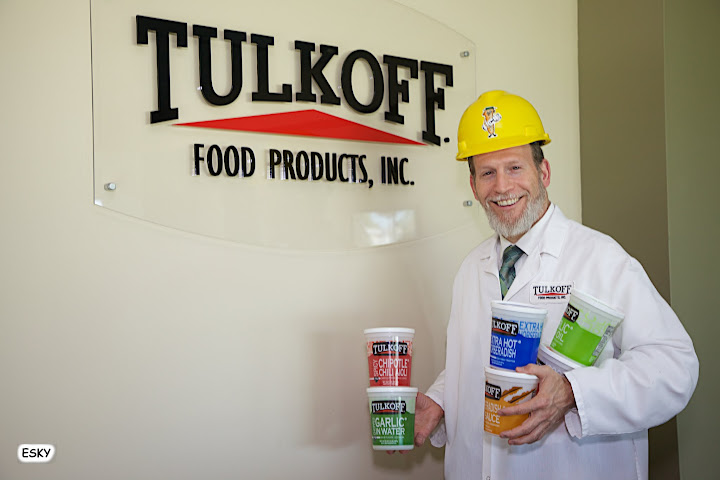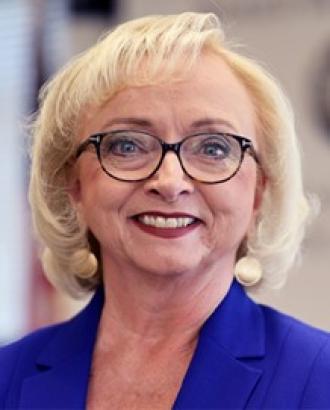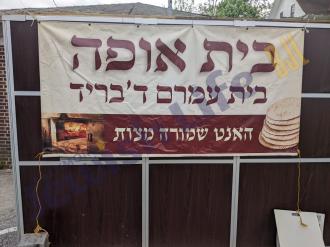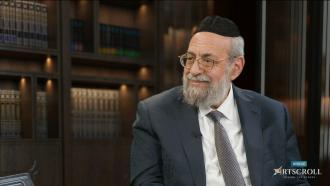Chrein by any Other Name
The “Eat More Horseradish” sign on the grounds of the Tulkoff Food Products plant outside Baltimore is not exactly subtle advertising, but the largest horseradish manufacturing plant in North America was never afraid of being on the sharp side.
After we enter the state-of-the-art facility, ranging over more than 80,000 square feet of a business park in suburban Dundalk, Maryland, we leave behind our jewelry and cell phones and suit up in white lab coats and red hair nets that designate our visitor status. We’re soon met by Meir (Michael) Tulkoff, director of specialty sales. He is more familiarly known as Magic Michael, and is famous in Israeli hospitals for helping raise the standards of medical clowning in Israel. In fact, he and his wife Debbie made aliyah 16 years ago, but when hospital budgets there were cut, he figured out a way of rejoining the family business without giving up the dream of living in Eretz Yisrael. He comes to the States twice a year for several weeks and works the rest of the time from his home in Rechovot via phone and e-mail.
Tulkoff — who became religious after college and spent the first three years after his wedding learning under Rabbi Nachman Bulman z”l in his kollel community in Migdal Ha’emek — grew up in a typical American Jewish traditional home, among family that was running a three-generations-old business. He points to a collection of photos, one of them taken in the early 1920s.
“My grandparents, Harry and Lena Tulkoff — Pop and Bubbe, who were Russian-born first cousins — are standing behind the counter of their small grocery store. On the counter, you can see individual eggs for sale, sweet butter, pot cheese, and Domino sugar priced at 18 cents a pound. There is some kind of netting over a product on the counter to keep the flies away.
“Bubbe had a side business of selling ground horseradish in paper boxes, and she also made borsht and other traditional foods. Family legend has it that one day, a woman walked into the grocery and pulled a piece of fruit out from the bottom of a perfectly stacked produce pyramid and knocked down the whole, neat pile. My grandfather blew his stack and said, ‘Forget it! What do we need this for? We’re just going to do what you make, Lena — horseradish!’
“By 1930, their horseradish became so popular that the Tulkoffs made it their exclusive product, under the name The New York Fruit Company, perhaps as a nod to where they were married in 1920. Its product line was expanded to include prepared white and red horseradish, relish, and horseradish mustard, among other food items. We’ve been OU certified since 1959, and before that, since the beginning, we were certified via local rabbis in Baltimore, like most kosher businesses before the advent of national certifiers. One of those local rabbis was Rabbi Samuel Pliskin z”l, father of the renowned Jerusalem-based author and therapist Rabbi Zelig Pliskin.”
Today Tulkoff Food Products produces and supplies condiments, sauces, dressings, and ingredients under its own label and for co-packing, supplying kosher and private brand markets across the US.
TiGer Stripes
Meir laughs as he points to a long-out-of-use ten-foot sign. “This monstrous sign from the early ’60s used to hang outside Tulkoff Horseradish on East Lombard Street. Our place was located near Pastore’s Fruits and Vegetables, Stone’s Bakery, and right next to the shochet. The street was only a block long, and it later became known as ‘Corned Beef Row’ — sort of the Baltimore equivalent of New York’s Lower East Side.”
Meir’s dad, Marty Tulkoff a”h, grew up in a tenement among Italians, Poles, and people of many other ethnicities. He initially attended the Talmudical Academy (TA).
“Not long ago,” says Meir, “I was in Denver on business and had the great merit to meet Rav Myer Schwab [principal of the Denver Bais Yaakov], who told me he remembered Marty Tulkoff from his first-grade TA class, as they both grew up in Baltimore.”
Today there’s a tiny street near the old location called “Horseradish Lane” in honor of Tulkoff.
Meir points to a vintage photo of Uncle Sol, Marty Tulkoff’s older brother, wearing a gauche faux-tiger-skin sport coat designed by the same tailor who supplied Liberace’s wardrobe. Next to the picture is the actual jacket, preserved in a glass case.
“Uncle Sol was 13 years older than my dad, who was born in 1935,” says Meir. “While Dad was collecting scrap metal on the streets of Baltimore for the war effort, Uncle Sol was serving in Europe, in the 802nd Tank Destroyer Battalion, targeting the German Tiger tanks. When he returned to Baltimore and went back into the family business, he named his horseradish-spices-mayonnaise creation Tiger Horseradish Sauce, in honor of that Tiger his tank destroyer battalion fought against. He would say that Tulkoff horseradish had the bite of a tiger.
“He was a real outgoing, boisterous sales guy and wanted to draw attention to his product by standing out — and boy, did he stand out with that jacket!”
Sauces and Shuttles
Meir and his brothers grew up around the East Lombard Street factory in the ’60s and ’70s. He shows us an old photo of burlap sacks, which held the staple ingredient of the production line. “These are the hundred-pound burlap bags of horseradish roots that my brothers Phil, Alec, and I used to slice open when we were kids, before we dumped the roots into the washing tumbler.”
But by 1978, the business had outgrown this building. Marty Tulkoff providentially heard that the nearby 21-acre site of the former Schaefer Beer brewery had been sold to a California Jewish man, who was disassembling everything to sell for scrap. Although Tulkoff had never met this man, he called him and said, “I’m Marty Tulkoff. I’m 43 years old. We are a family business. Will you sell it to us?” The guy said okay — for a million dollars. A non-Jewish banker at Union Trust helped push through the million-dollar loan, which was eventually paid off. In the end, the former brewery turned out to be ill-suited for horseradish production. The Tulkoff factory made use of only one of the buildings — the one where beer cans were made.
When Marty’s son Phil — Michael’s oldest brother — took over about 17 years ago, he sold that property and eventually moved Tulkoff Foods to its present location. He built the new facility from the ground up, specifically as a condiments, sauces, and dressings manufacturing facility. It’s considered one of the most modern plants of its type in the country.
When Phil took over, the company passed to a third generation. But that wasn’t really Phil’s plan. He was a trained mechanical engineer and was working on projects at NASA’s Goddard Space Flight Center. But Uncle Sol had already passed away, and their father was no longer well enough to run the company.
“Phil used to say, ‘I learned to be a mechanical engineer and put shuttles into space so I could make horseradish.’ But he really stepped in and raised the organization a tremendous caliber, in large part, due to his systems background,” Meir says. “During the first year, he told our youngest brother Alec, a historian, that he really wanted him to run our West Coast plant out in California. There was a hired guy out there but, as the Gemara says, ‘No one is going to care for your needs and desires as much as yourself.’ Alec started working for us about 16 years ago and has made the West Coast plant a gleaming center of productivity. My younger brother wears many hats and inherited our dad’s amazing creative talent.”
No Laughing Matter
Meanwhile, Meir was finding a different kind of spice in his life. “After college, I went hitchhiking through Europe and met some special people who were involved in kiruv in Madrid. I really liked them and they impressed me. Although their derech wasn’t exactly mine, that’s what started me off. More than a year later, when I came back to the States for Phil’s wedding, I was already on my way, wearing tzitzis.
“Debbie and I met in Baltimore, 30-plus years ago, and we both decided we wanted to live in Eretz Yisrael,” continues Meir. “We spoke with Rabbi Naftali Neuberger z”l for advice about where to settle after making aliyah. Thirty days after we married, we moved there for three years. We joined Rav Bulman’s kollel community of Kiryat Nachliel in Migdal Ha’emek, where I learned and Debbie taught special ed. We returned to the States to pay off our school loans, but ‘got stuck’ in Baltimore for 11 years before we made aliyah officially, 16 years ago. Our oldest was 12 at the time; we have now been blessed with two fantastic sons-in-law and grandchildren.”
Meir and his family moved to Rechovot and joined the Chatam English-speaking kehillah under the guidance of Rav David Stein. Meir had planned on marketing products from Eretz Yisrael to chutz l’Aretz, but Hashem had other plans for him. Instead, he became a “medical magician,” a hospital educational entertainer who took the stage for nine years in children’s wards around the country.
“I was and still am a badchan chinuchi,” says Meir, who gained popularity as Magic Michael and prefers the term “medical magician” to “hospital clown,” because he’s always incorporated an element of rehabilitation into his tricks and schtick. “For years I performed clown-like antics for pediatric and adolescent patients as part of achieving their therapeutic goals in Alyn Hospital, and in the general pediatric wards of Dana Children’s Hospital in Tel Aviv (part of Ichilov) and Safra Children’s Hospital at Sheba Medical Center (Tel Hashomer). It was very special, but budgets disappeared.”
His brother Phil offered him a position at Tulkoff, and although Meir initially replied that he was not moving back to the States, Meir’s wife Debbie encouraged him to try it out for two years. He traveled back and forth, leaving his family; today, as the director of specialty sales, he comes to the States every six months, for about three weeks, to see prospective and existing clients. When he works from home in Israel, he factors in the seven-hour time difference with the East Coast and the ten-hour gap with California.
Mashed & Mixed
As we step into the frigid 28-degree freezer storage room, we get our first real whiff of pungent horseradish. As we look up and down in wonderment at the approximately 2 million pounds of raw horseradish roots, just over a half-ton in each bale, stretch-wrapped in royal blue plastic, safety coded, and piled 40 feet high, Meir rips open a bale.,
“We aren’t farmers,” he explains, “so we purchase an enormous amount — millions and millions of pounds of horseradish roots every year. We’re the largest purchaser of horseradish in all of North America. It’s harvested from November through May, shipped to our factory in refrigerated trucks, and stored until needed. It’s pressure-cleaned with plain water — no chemicals or soaps — put through a metal detector for safety, and then milled — ground very finely. Then, depending upon the recipe, ingredients such as vinegar, salt, mayonnaise, and tomato paste are added.”
Next, we follow Meir to the production room, where the day starts as early as 4 a.m. The ground horseradish mixture is pumped through huge stainless-steel pipelines — labeled in bright colors — directly to where it undergoes the next step. That could be a vat where it is mixed with mayonnaise and spices to make Tiger Sauce, or it may go to a vat to be mixed with tomato paste and spices to make Cocktail Sauce. Or, it may be pureed further and pumped into other recipe mixes.
Some products are refrigerated, but there are shelf-stable products as well. We go to the cooling tunnel, where the cooked products that were filled hot are cooled off in a bath. Next, there’s labeling and packing. We watch as robotics are used to put the boxes of Chipotle Chili Aioli on wooden pallets before they’re moved by a forklift into an enormous refrigeration area.
“We sell millions of pounds of garlic and millions of pounds of horseradish — and all of those things in between,” says Meir. “We manufacture other people’s recipes of specific products and our products — that’s referred to as co-packing. We also produce our recipes with other companies’ labels — that’s referred to as private labeling. Together with our West Coast manufacturing facility, we produce horseradish, garlic, ginger, pesto, seafood sauces, aioli, and custom sauces for retail, food service, co-pack, private label, raw ingredients, and industrial clients, nationwide.”
Business is Hot
The facility is immaculately clean and meticulously organized — down to the white, red, and green brooms and brushes hanging on the wall, color-coded to differentiate food-contact, non-food-contact, and floor-cleaning. Meir explains that after the production is done, the sanitation team comes in. “They’re not just dusting. They’re using high-powered hot water and chemicals to clean everything down, every single day. It’s very sterile.
“You know,” he quips, “You can’t just go out to buy a horseradish-washing machine to wash down a couple of tons of horseradish at a time, so our in-house staff has created quite a bit of our own equipment.”
Meir notes that to avoid flushing mud down the drain, even the dirt that is flushed off the horseradish roots and ginger hands is put into a centrifuge to refine it to a condensed sludge that can be repurposed and sold or put into a landfill. The residual wastewater then complies with governmental environmental-impact regulations, and can enter the sewage system.
“We also try to recycle,” says Meir. “We don’t throw away broken wooden pallets, we sell them to someone who fixes them and resells them to somebody else. Any cardboard packaging is put into a large compacting machine and gets crushed to a very dense and heavy bale of corrugate that gets sold to a recycling company.
“The building itself was designed to be a green, ecologically friendly structure — the lights go on and off automatically in the factory, the roof is intentionally white to decrease ecological impact, and we have special kinds of lights that are energy saving and friendly to the environment. We try, any way that we can, to make a difference.”
When I ask Meir how it feels to once again be part of his family’s fourth-generation business, he deadpans, “It brings tears to my eyes.
“Actually, that’s my father’s corny sense of humor we’ve all been infected with. When people would ask him how’s business, he would answer, ‘Business is hot,’ or ‘It’s a real grind.’ But seriously, it makes me extremely proud and honored that HaKadosh Baruch Hu has blessed our family.
“Before I married, I worked alongside my dad a”h for three to four years. We would leave the house in the morning when it was still dark out to drive down to the old plant. When we pulled into the parking lot he would say, ‘Michael, see those 50 cars in the parking lot? Those aren’t 50 cars, those are 50 families we are responsible for.’ That’s the kind of work ethic our parents ingrained in us.”
Photo Credit: Esky Cook)




































































